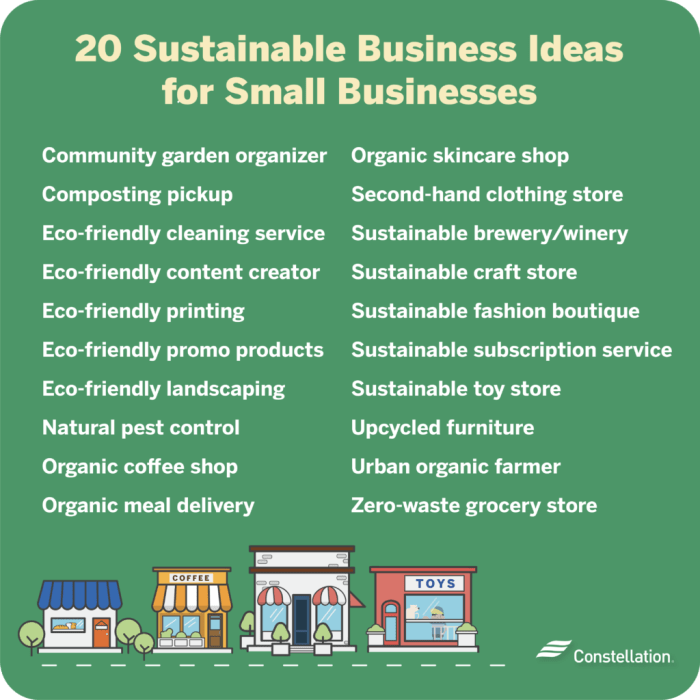As we step into the next decade, the focus on Sustainable Business Ideas becomes more critical than ever. This article delves into various innovative models, technologies, and practices that are shaping the future of sustainable business. Get ready to explore the exciting possibilities that lie ahead!
Sustainable Business Models
Sustainable business models are crucial for the future of our planet and economy. These models prioritize environmental and social impacts alongside financial profitability, ensuring long-term success while contributing to a more sustainable world.
Innovative Sustainable Business Models
- Collaborative Consumption: Platforms like Airbnb and Uber enable individuals to share resources, reducing waste and promoting efficiency.
- Circular Economy: Companies like Patagonia and IKEA are adopting circular business models, focusing on recycling, refurbishing, and reusing products to minimize waste.
- B Corporations: Certified B Corps, such as Ben & Jerry's and Allbirds, integrate social and environmental missions into their core business strategies.
Importance of Integrating Sustainability
Integrating sustainability into business models is essential for long-term viability and success. Companies that prioritize sustainability not only reduce their environmental footprint but also attract a growing base of conscious consumers and investors who value ethical practices.
Green Technology Applications
Green technology plays a crucial role in promoting sustainability across various industries. By harnessing innovative solutions, businesses can reduce their environmental impact and contribute to a greener future.
Renewable Energy Sources
- Solar Power: Utilizing solar panels to generate electricity from sunlight, reducing the reliance on fossil fuels.
- Wind Power: Harnessing wind turbines to produce clean energy, decreasing carbon emissions.
- Hydropower: Generating electricity from flowing water, a renewable energy source with minimal environmental impact.
Energy-Efficient Practices
- LED Lighting: Implementing energy-efficient lighting solutions to reduce electricity consumption and lower carbon footprint.
- Smart Building Technologies: Using sensors and automation to optimize energy usage in commercial and residential properties.
- Energy Management Systems: Monitoring and controlling energy consumption to improve efficiency and sustainability.
Sustainable Transportation
- Electric Vehicles: Embracing EVs to reduce emissions and promote eco-friendly commuting options.
- Public Transportation Systems: Investing in efficient public transit to decrease traffic congestion and air pollution.
- Bike-Sharing Programs: Promoting cycling as a sustainable mode of transportation in urban areas.
Circular Economy Practices
The concept of a circular economy involves designing out waste and pollution, keeping products and materials in use, and regenerating natural systems. This shift away from the traditional linear "take-make-dispose" model offers several benefits for businesses, including cost savings, reduced resource dependency, and improved brand reputation for sustainability efforts.
Companies Implementing Circular Economy Principles
- Apple: The tech giant has committed to using 100% recycled or renewable materials in its products, reducing the need for virgin resources and minimizing waste.
- Patagonia: The outdoor clothing company promotes repair and reuse of its products through initiatives like Worn Wear, extending the lifespan of their garments.
- IKEA: The furniture retailer has introduced a circular initiative to take back and refurbish old furniture, promoting a more sustainable consumption model.
Challenges and Opportunities of Transitioning to a Circular Economy Model
- Challenges:
- Initial Investment: Shifting to circular practices may require upfront investments in new technologies and processes.
- Supply Chain Complexity: Implementing a circular economy model can be challenging due to the need for collaboration across the entire supply chain.
- Consumer Behavior: Educating and engaging consumers in the circular economy may require a shift in mindset and habits.
- Opportunities:
- Innovation: Embracing circular economy principles can drive innovation in product design, material sourcing, and waste reduction.
- New Revenue Streams: Companies can explore new business models, such as product-as-a-service or rental programs, to generate additional revenue.
- Resilience: A circular economy model can enhance business resilience by reducing reliance on scarce resources and mitigating environmental risks.
Ethical Sourcing and Supply Chain
Ethical sourcing plays a crucial role in sustainable business practices by ensuring that products are sourced in a responsible and sustainable manner. This involves considering the social, environmental, and ethical impacts of sourcing materials and products throughout the supply chain.
Importance of Ethical Sourcing
Ethical sourcing is essential for maintaining transparency and accountability in the supply chain. It helps businesses build trust with consumers, investors, and stakeholders by demonstrating a commitment to social and environmental responsibility. By sourcing products ethically, companies can also contribute to the well-being of workers, local communities, and the environment.
Strategies for Creating a Transparent Supply Chain
- Implementing codes of conduct for suppliers to ensure compliance with ethical standards.
- Conducting regular audits and assessments of suppliers to monitor their practices.
- Building strong relationships with suppliers based on trust and collaboration.
- Providing training and support to suppliers to help them improve their social and environmental performance.
- Using technology such as blockchain to track and trace products throughout the supply chain.
Benefits of Ethical Sourcing
- Reduced risk of supply chain disruptions due to unethical practices.
- Improved brand reputation and customer loyalty.
- Positive impact on the environment and local communities.
- Attraction of socially responsible investors and partners.
- Compliance with regulations and standards related to sustainability and ethics.
Social Impact Initiatives
Incorporating social impact initiatives into business strategies is crucial in today's world. By focusing on more than just profits, businesses can positively contribute to society, the environment, and overall well-being. This not only enhances their brand reputation but also creates a sustainable future for all.
Examples of Businesses Making a Positive Social Impact
- Patagonia: Known for its commitment to environmental sustainability, Patagonia donates a percentage of its sales to grassroots environmental organizations and supports fair labor practices.
- TOMS: Through its One for One model, TOMS donates a pair of shoes to a child in need for every pair purchased, addressing the issue of poverty and lack of access to basic necessities.
- Ben & Jerry's: Beyond making delicious ice cream, Ben & Jerry's focuses on social justice issues and uses its platform to advocate for racial equity, climate justice, and LGBTQ+ rights.
Role of Businesses in Addressing Social Issues
Businesses play a significant role in addressing social issues and contributing to community development. By implementing sustainable practices, supporting local initiatives, and fostering a culture of inclusivity, businesses can create a positive impact on society as a whole.
Closing Notes

In conclusion, Sustainable Business Ideas for the Next Decade offer a roadmap towards a more environmentally conscious and socially responsible future. By embracing these strategies, businesses can pave the way for a more sustainable and prosperous tomorrow.
FAQ Resource
How can businesses benefit from implementing sustainable business models?
Businesses can benefit from reduced costs, improved brand reputation, and access to new markets by adopting sustainable business models.
What are some examples of green technologies that businesses can leverage?
Examples include solar panels for energy generation, water-saving technologies, and eco-friendly packaging solutions.
Why is ethical sourcing important for sustainable business practices?
Ethical sourcing ensures fair treatment of workers, reduces environmental impact, and enhances overall supply chain transparency.
How can businesses incorporate social impact initiatives into their strategies?
Businesses can partner with non-profits, launch community projects, or donate a portion of their profits to social causes to create a positive impact.






